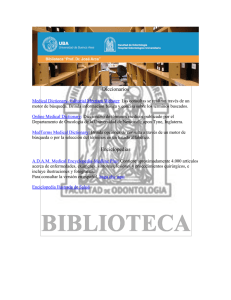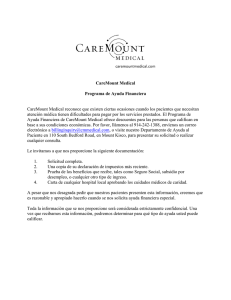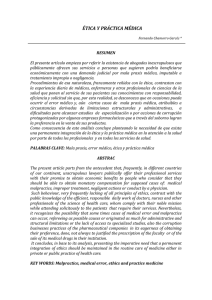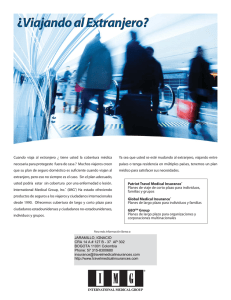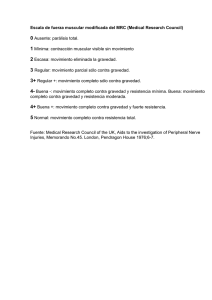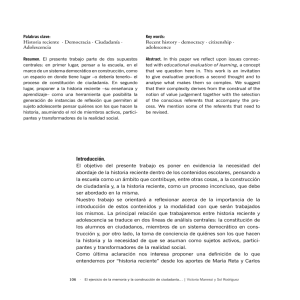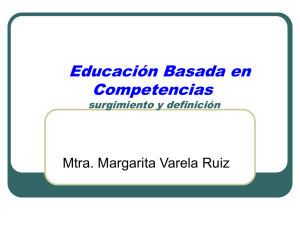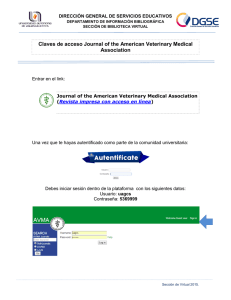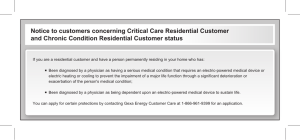Definición de `Profesión médica`, `Profesional médico/a` y
Anuncio
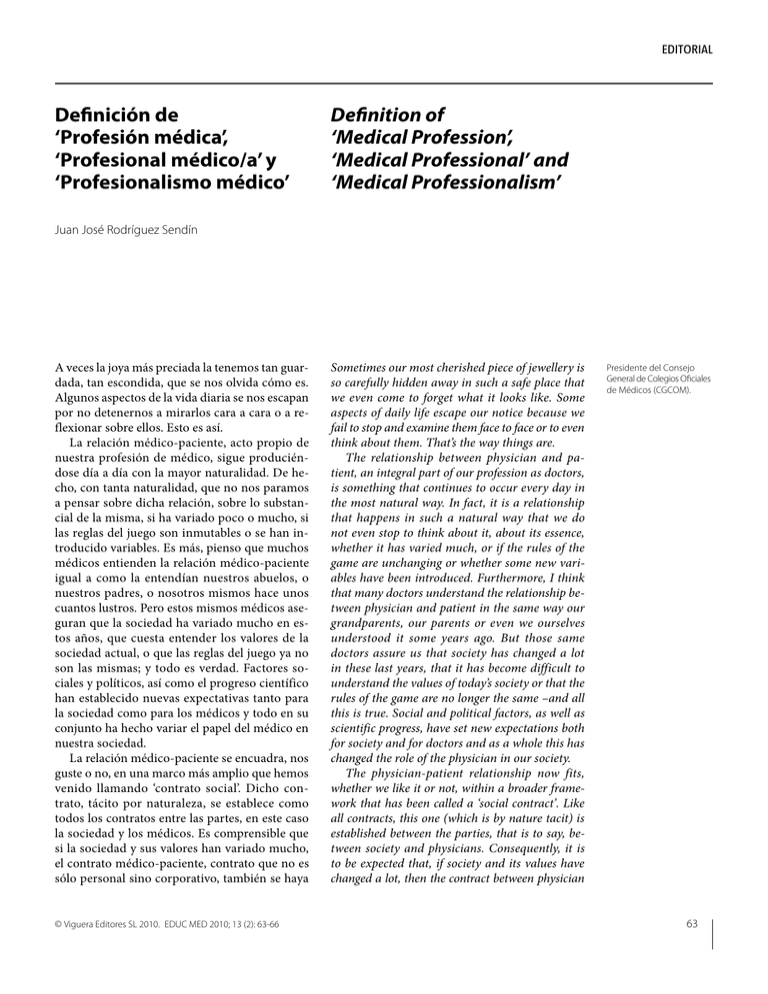
EDITORIAL Definición de ‘Profesión médica’, ‘Profesional médico/a’ y ‘Profesionalismo médico’ Definition of ‘Medical Profession’, ‘Medical Professional’ and ‘Medical Professionalism’ Juan José Rodríguez Sendín A veces la joya más preciada la tenemos tan guardada, tan escondida, que se nos olvida cómo es. Algunos aspectos de la vida diaria se nos escapan por no detenernos a mirarlos cara a cara o a reflexionar sobre ellos. Esto es así. La relación médico-paciente, acto propio de nuestra profesión de médico, sigue produciéndose día a día con la mayor naturalidad. De hecho, con tanta naturalidad, que no nos paramos a pensar sobre dicha relación, sobre lo substancial de la misma, si ha variado poco o mucho, si las reglas del juego son inmutables o se han introducido variables. Es más, pienso que muchos médicos entienden la relación médico-paciente igual a como la entendían nuestros abuelos, o nuestros padres, o nosotros mismos hace unos cuantos lustros. Pero estos mismos médicos aseguran que la sociedad ha variado mucho en estos años, que cuesta entender los valores de la sociedad actual, o que las reglas del juego ya no son las mismas; y todo es verdad. Factores sociales y políticos, así como el progreso científico han establecido nuevas expectativas tanto para la sociedad como para los médicos y todo en su conjunto ha hecho variar el papel del médico en nuestra sociedad. La relación médico-paciente se encuadra, nos guste o no, en una marco más amplio que hemos venido llamando ‘contrato social’. Dicho contrato, tácito por naturaleza, se establece como todos los contratos entre las partes, en este caso la sociedad y los médicos. Es comprensible que si la sociedad y sus valores han variado mucho, el contrato médico-paciente, contrato que no es sólo personal sino corporativo, también se haya © Viguera Editores SL 2010. EDUC MED 2010; 13 (2): 63-66 Sometimes our most cherished piece of jewellery is so carefully hidden away in such a safe place that we even come to forget what it looks like. Some aspects of daily life escape our notice because we fail to stop and examine them face to face or to even think about them. That’s the way things are. The relationship between physician and patient, an integral part of our profession as doctors, is something that continues to occur every day in the most natural way. In fact, it is a relationship that happens in such a natural way that we do not even stop to think about it, about its essence, whether it has varied much, or if the rules of the game are unchanging or whether some new variables have been introduced. Furthermore, I think that many doctors understand the relationship between physician and patient in the same way our grandparents, our parents or even we ourselves understood it some years ago. But those same doctors assure us that society has changed a lot in these last years, that it has become difficult to understand the values of today’s society or that the rules of the game are no longer the same –and all this is true. Social and political factors, as well as scientific progress, have set new expectations both for society and for doctors and as a whole this has changed the role of the physician in our society. The physician-patient relationship now fits, whether we like it or not, within a broader framework that has been called a ‘social contract’. Like all contracts, this one (which is by nature tacit) is established between the parties, that is to say, between society and physicians. Consequently, it is to be expected that, if society and its values have changed a lot, then the contract between physician Presidente del Consejo General de Colegios Oficiales de Médicos (CGCOM). 63 J.J. Rodríguez-Sendín modificado. Pero hay que advertir que no ha variado todo. Algunos valores siguen siendo tan válidos hoy como ayer y por ello es necesario proclamar tanto los que han evolucionado con la sociedad como los que permanecen inmutables. De estos últimos valores destacaría la confianza que se establece entre el médico y el paciente por ser consustancial y necesaria para la efectividad del acto médico e incluso determinante para la sostenibilidad del Sistema Nacional de Salud. Es imposible que ninguna exploración minuciosa ni la relación más completa de pruebas diagnósticas puedan sustituir la información obtenida del paciente en un marco de confianza mutua. Por todos estos motivos, y al igual como lo han hecho múltiples corporaciones médicas internacionales, el Consejo General de Colegios Oficiales de Médicos (CGCOM) de España ha considerado necesario mirar cara a cara a la sociedad y reflexionar sobre las características y cambios del contrato social médico-paciente. Fruto de un trabajo de análisis, la Asamblea de la Organización Médica Colegial (OMC) ha aprobado el 20 de marzo de 2010 unas reflexiones que en forma de definición pretenden que no se nos olvide a quién nos debemos y a qué nos comprometemos. A continuación se presenta la conceptualización de tres términos estrechamente relacionados con nuestra profesión: ‘profesión médica’, ‘profesional médico/a’ y ‘profesionalismo médico’. Estas definiciones no son el final de un camino, son el principio. Asumimos la responsabilidad de mantener actualizado lo que ha de ser el ideario profesional de la OMC y que ha de mantener el mismo paso que sigue la sociedad. El CGCOM, al aprobar estas definiciones, quiere transmitir una idea sencilla pero de gran calado. Queremos proclamar, sencillamente, que para realizar una atención sanitaria de calidad cada médico/a que ejerce en España no sólo debe poseer los conocimientos y habilidades necesarios en el máximo grado posible, sino que además debe comprometerse con un conjunto de valores, manifestar una serie de actitudes y mantener unas conductas que tomadas en su conjunto son denominadas por la comunidad científica internacional ‘profesionalismo médico’. No quiero terminar sin subrayar una obviedad. Este posicionamiento que el CGCOM hace público hoy no va dirigido sólo a los médicos que en buena parte han profesado el profesiona64 and patient, which is both a corporative and a personal agreement, will also have undergone some modifications. But it must be pointed out that not everything has changed. Some values are still as valid today as they were in the past and it is therefore necessary to highlight both those that have evolved with society and those that remain unchanged. Among these last values, I would underline the trust that is established between doctor and patient owing to its being inherent and necessary for the effectiveness of medical practice and even plays a decisive role in the sustainability of the National Health System. Not even the most meticulous examination or the most thorough battery of diagnostic tests can replace the information obtained from the patient within a framework of mutual trust. All these reasons have led the General Council of Official Medical Associations in Spain (CGCOM), like many other international medical corporations, to deem it necessary to look at society face to face and reflect on the characteristics of the social contract between physician and patient and how it has changed. After a careful analysis, on March 20th 2010, the Assembly of the Spanish General Medical Council (OMC) approved a set of deliberations that, in the form of definitions, aim to keep us from forgetting who we have a duty to and what we have a commitment to. In the following, we outline the conceptualisation of three terms that are closely related with our profession: ‘medical profession’, ‘medical professional’ and ‘medical professionalism’. These definitions are just the beginning of a path, not its end. We take on the responsibility of regularly updating what must be the professional ideology of the OMC and must keep pace with society. By approving these definitions, the CGCOM wishes to convey a simple, but very significant, idea. Quite simply we want to make it known that in order to provide high quality health care, each physician who practises in Spain must not only possess the greatest possible amount of the knowledge and skills needed for the job, but must also commit him or herself to a set of values, display a series of attitudes and behave in a way that, as a whole, is known to the international scientific community as ‘medical professionalism’. I do not want to end without underlining something that may seem obvious. This standpoint that the CGCOM today makes publicly known is not aimed only at doctors, who have mostly exercised medical professionalism since they began © Viguera Editores SL 2010. EDUC MED 2010; 13 (2): 63-66 Editorial lismo médico desde siempre. Nos dirigimos a los estudiantes que mañana serán médicos, nos dirigimos a todas las profesiones sanitarias, nos dirigimos a los académicos y a la Administración. Pero, sobre todo, lo que queremos es manifestar nuestro compromiso con el paciente en singular y con la sociedad en plural. El paciente y la sociedad valoran positivamente al médico y ponen su confianza en la profesión médica; nosotros, la profesión y los médicos, agradecemos este honor con el compromiso de mostrar y demostrar que nuestra guía es la calidad del acto médico. their careers. We are addressing the students who will be tomorrow’s doctors, we are addressing all the health care professions, and we are addressing the academics and the Authorities. But, above all, what we want to do is to state our commitment with the individual patient and with society as a whole. Both patient and society value the physician positively and place their trust in the medical profession; we, the profession and the physicians, are honoured by such confidence and in return offer our commitment to show and prove that what guides us is the quality of our medical practice. Profesión médica Medical Profession Ocupación basada en el desempeño de tareas encaminadas a promover y restablecer la salud y a identificar, diagnosticar y curar enfermedades aplicando un cuerpo de conocimiento especializado propio de nivel superior, en la que preside el espíritu de servicio y en la que se persigue el beneficio del paciente antes que el propio, y para la cual se requiere que las partes garanticen la producción, el uso y la transmisión del conocimiento científico, la mejora permanente para prestar la mejor asistencia posible, la aplicación del conocimiento de forma ética y competente, y que la práctica profesional se oriente hacia las necesidades de salud y de bienestar de las personas y de la comunidad. The Medical Profession is an occupation that performs tasks addressed to promote and restore health and to identify, diagnose and cure diseases, utilizing a superior body of specialized knowledge presided by a spirit of service so that the benefits of the professionals are the consequence of the benefits obtained by the patients, for which purpose there is a requirement to warrant: the production, transmission and utilization of scientific knowledge; the constant improvement of the best possible care; the ethical and competent use of knowledge; and the orientation of the professional practice to the health needs and wellbeing of the people and the communities. Profesional médico/a Medical Professional Médico o médica titulado/a comprometido/a con los principios éticos y deontológicos y los valores de la profesión médica y cuya conducta se ciñe a dichos principios y valores. The Medical Professional is a university medical school graduate committed to the ethical principles and values of the medical profession –medical professionalism– which behavior follows them strictly. Profesionalismo médico Medical Professionalism Conjunto de principios éticos y deontológicos, valores y conductas que sustentan el compromiso de los profesionales de la medicina con el servicio a los ciudadanos, que evolucionan con los cambios sociales y que avalan la confianza que la población tiene en los médicos. Medical Professionalism is the professed believes consisting in a set of ethical and deontological principles and values supporting the professional commitment of service to the citizens that evolve with the societal changes and support the trust of the people on the physicians. © Viguera Editores SL 2010. EDUC MED 2010; 13 (2): 63-66 65 J.J. Rodríguez-Sendín Principios fundamentales del profesionalismo médico El ejercicio de la profesión médica exige anteponer los intereses del paciente a los del propio médico, base de la confianza que el paciente deposita en el médico, exigencia que se sustenta, entre otros principios, por los de beneficencia, no maleficencia, autonomía y justicia. Valores fundamentales del profesionalismo médico Los profesionales de la medicina ponen a disposición de la población los conocimientos, las habilidades y el buen juicio para promover y restablecer la salud, prevenir y proteger de la enfermedad, y mantener y mejorar el bienestar de los ciudadanos. En consecuencia, la práctica diaria del profesional médico implica el compromiso con: • La integridad en la utilización del conocimiento y en la optimización de los recursos. • La compasión como guía de acción frente al sufrimiento. • La mejora permanente en el desempeño profesional para garantizar la mejor asistencia posible al ciudadano. • La colaboración con todos los profesionales e instituciones sanitarias en aras de la mejora de salud y el bienestar de la población. 66 Fundamental principles of the medical professionalism The professional practice demands that the patients interests are never surrogated to the medical interests, based on the trust of the patient on the physician and on the other ethical principles of beneficence, no maleficence, autonomy and justice. Fundamental values of the medical professionalism The medical profession provides them with knowledge, skills and judgment to promote health, prevent and protect from diseases, and maintain and improve the wellbeing of the citizens. The daily practice of the medical professional implies a commitment to: • Integrity in the use of knowledge and resources. • Compassion as a guiding principle when dealing with suffering. • Continuous improvement of the professional performance in order to warrant the best possible care. • Cooperation with all health professionals and health care providing institutions in order to improve the people’s health and wellbeing. © Viguera Editores SL 2010. EDUC MED 2010; 13 (2): 63-66
